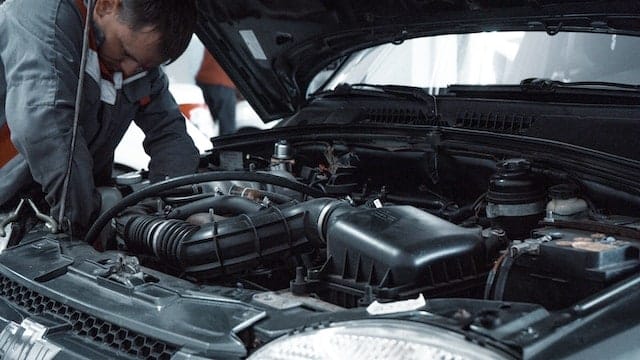
When your car’s A/C isn’t working well, your journey can become stressful. To help, here are 10 simple tips to regulate humidity within your A/C system. After going through these tips, we’ll move on to more detailed parts of managing the humidity in your car’s A/C system.
10 Easy Tips to Combat Humidity in Your Car’s A/C System

Many drivers grapple with excessive humidity within their car’s cooling system, especially during the warmer months. Here, we provide ten simple and practical solutions that might help you take control of your car’s climate.
1. Switch to Recirculate Mode
One of the simplest things to try is to switch your car’s air conditioning to recirculate mode. This mode recycles the already cooled air inside your vehicle, instead of drawing in outside air, which can sometimes be humid.
2. Use the Defrost Setting
The defrost setting on your A/C system can help to remove moisture from the air, reducing humidity. It’s particularly effective in cooler, more humid months.
3. Park in Shade
Whenever possible, park your car in shaded areas. Direct sunlight can drastically increase your car’s internal temperature, forcing your A/C to work harder to cool down. When parked in shade, your car will naturally stay cooler, reducing the burden on the A/C.
4. Crack Windows When Parked
If you’re parking your car for a prolonged period on a hot day, crack the windows slightly. This will allow the hot air trapped inside your car to escape, making your A/C’s job easier when you return.
5. Use Windshield Sun Shades

When your car is parked, use windshield sun shades to reduce the heat buildup inside your car. The less heat the A/C system has to combat, the less likely it is to become humid.

6. Set the Right Temperature
Contrary to popular belief, blasting the air conditioning at the lowest temperature setting is not always the best option. Instead, aim for a moderate temperature, as very cold settings can sometimes create excess moisture.
7. Ventilation Before A/C
When getting into your hot car, open the windows first to let the hot air escape, then turn on the A/C. Once the A/C system cools down the interior, close the windows to keep the cool, dehumidified air inside.
8. Keep Windows and Sunroof Closed
If you’re driving in a humid environment, try to keep your windows and sunroof closed as much as possible. These can let in humid air, which your A/C system then has to work harder to cool down.
9. Use a Portable Dehumidifier

Consider using a portable dehumidifier in your vehicle. While it’s a less conventional method, it can help to remove excess moisture from the air, contributing to a more comfortable environment.
10. Check the Cabin Air Filter

The cabin air filter helps to clean the air that enters the car’s interior and can contribute to a more comfortable environment. If it’s dirty or clogged, it can make your A/C feel less effective and more humid. Refer to your vehicle’s owner’s manual for the location of the filter and instructions on how to check and replace it.
If these tips don’t help, it’s a good idea to have your car’s A/C system checked by a professional, as there may be a more complex issue at hand, such as a leak or a malfunctioning component. For more detailed information about humidity in vehicle A/C systems, see the sections below.
Common Causes of Humidity in Car A/C Systems
Humidity in a car’s A/C system may stem from several key components malfunctioning or failing. A blocked or unclean evaporator can impede moisture absorption, raising humidity. Low refrigerant levels could curtail cooling capacity, hindering moisture removal. A faulty condenser can degrade the system’s cooling and dehumidifying efficiency. An impaired expansion valve or a clogged drain tube might lead to impaired cooling and increased humidity levels, respectively.
Lastly, a defective compressor may diminish the refrigerant circulation and the system’s overall cooling and dehumidifying ability, contributing to increased humidity. Recognizing these factors can assist in addressing car A/C humidity issues.
A well-functioning car air conditioning (A/C) system is essential for maintaining a comfortable driving environment, especially during hot summer months. However, many drivers experience a common issue where their car A/C feels humid, making the cabin feel stuffy and uncomfortable.

Car A/C systems not only cool the air inside the vehicle but also help control humidity levels. They use a process called the refrigeration cycle to remove heat and moisture from the air. Key components of this cycle are the evaporator and condenser, which work together to remove moisture and provide cool, dry air to the cabin.
The evaporator, located inside the vehicle, absorbs heat and moisture from the air, turning the refrigerant from a low-pressure gas to a high-pressure liquid. The condenser, located near the car’s radiator, then releases the heat absorbed by the refrigerant, turning it back into a low-pressure gas. This cycle continues, effectively reducing humidity levels inside the vehicle. The consistent cycle of these operations ensures low humidity within your vehicle. However, issues can occur, causing the A/C system’s efficiency to wane.
Accumulation on the Evaporator
With time, the evaporator can become laden with debris, dirt, or mold. This accumulation hinders the evaporator’s effectiveness to absorb moisture, causing an escalation in the vehicle’s humidity levels.
Insufficient Refrigerant Levels
If your A/C system’s refrigerant levels drop, it diminishes the system’s capacity to cool, rendering it less effective in moisture extraction from the air.
Malfunctioning Expansion Valve
The expansion valve is a crucial component that directs the flow of refrigerant to the evaporator. A faulty or non-functional valve can inhibit the A/C system’s cooling and dehumidification capabilities.
Blocked or Damaged Drain Tube
The drain tube acts as an exit route for the moisture amassed by the evaporator. Any blockages or damages can lead to water build-up, thereby escalating the vehicle’s humidity levels.
Faulty Condenser
The condenser plays a key role in your car’s A/C system by cooling the hot refrigerant gas and reverting it into a high-pressure liquid that’s ready for further cooling by the evaporator. A malfunctioning or broken condenser cannot effectively cool the refrigerant, reducing the evaporator’s cooling and dehumidification capacity.
Compressor Issues
A malfunctioning compressor can lead to the A/C system emitting humid air. The compressor, as the heart of the A/C system, is responsible for compressing and circulating the refrigerant, which is crucial for heat and humidity removal from the car’s interior. A compressor failing to pressurize the refrigerant effectively leads to diminished cooling capacity, which may result in the emission of humid air from the vents.
Each of these components plays a vital role in maintaining a comfortable climate within your vehicle, and their failure can lead to an increase in humidity levels. Therefore, regular inspection and maintenance of your car’s A/C system is recommended.
How to Identify and Address Humidity Issues in Car A/C Systems


Cleaning the evaporator
You can try DIY methods, such as using a foaming cleaner or compressed air, to clean the evaporator. If the problem persists, consider seeking professional help.
Compressed Air Method

- Locate the evaporator: It’s usually found behind the dashboard.
- Using a can of compressed air, blow off the dust and debris from the evaporator coil.
- Ensure the surrounding area is cleaned up afterwards to avoid recirculation of the dust and debris.
Foaming Cleaner Method

- Locate the evaporator: It’s usually found behind the dashboard.
- Spray the evaporator coil with a foaming cleaner, following the product’s instructions for how much to apply and how long to let it soak.
- Rinse off the cleaner using a low-pressure water source, or let it evaporate if the cleaner is self-rinsing.
- Allow the evaporator to dry completely before reassembling.
Checking and replenishing refrigerant levels
Signs of low refrigerant include poor cooling performance and frost on the A/C lines. It is essential to use the correct refrigerant and follow proper methods for adding it to the system.
Repairing or replacing malfunctioning components
Diagnose and address component failures as needed, and decide whether to repair or replace the affected parts.
Regular maintenance and inspection
Scheduling routine A/C system checks can help identify potential problems early and ensure optimal performance.
Preventative Measures to Maintain Optimal Car A/C Performance
Regular cabin filter replacement

Changing the cabin filter helps maintain proper airflow and prevents debris from entering the A/C system.
Parking in shaded areas or using sunshades
Reducing direct sunlight on the vehicle can help minimize heat buildup and reduce the load on the A/C system.
Proper ventilation
Regularly ventilating the cabin can help reduce moisture buildup inside the vehicle.
Avoiding excessive use of recirculation mode
Constantly recirculating the air can increase humidity levels, so try to use fresh air intake when possible.
Car A/C Feels Humid: Costs For Repair and Replacement

When a car’s air conditioning (A/C) system feels humid, several issues might be at play, such as a blocked or dirty evaporator, low refrigerant levels, a malfunctioning expansion valve, or a clogged or damaged drain tube. Addressing these problems can come with a range of costs, varying greatly based on your location, the make and model of your vehicle, and the individual repair shop. It’s important to understand that while some minor issues may be relatively inexpensive to fix, like unclogging a drain tube, others can significantly impact your wallet, such as replacing a dirty evaporator. Always seek multiple quotes to ensure you’re getting a fair price for any repairs or replacements needed.
Blocked or Dirty Evaporator
Cleaning an evaporator can cost between $100 to $400, depending on the vehicle and how difficult it is to reach the evaporator. Replacement can cost from $600 to $1,500, largely due to the labor involved.
Low Refrigerant Levels
The cost to recharge an A/C system can range from $120 to $300. If there’s a leak causing the low refrigerant levels, then repair costs could start around $200 and go upwards, depending on the severity and location of the leak.
Malfunctioning Expansion Valve
The cost to replace an expansion valve typically ranges between $200 and $450, including parts and labor.
Clogged or Damaged Drain Tube
If the drain tube is simply clogged, it might be cleaned out at minimal cost, often less than $100. However, if the tube is damaged and needs replacing, the cost can range from $100 to $300.
Navigating Car A/C Settings in Extreme Heat

Driving in extreme heat can be more than uncomfortable; it can be downright dangerous. As temperatures soar to 105 degrees Fahrenheit or even higher, many drivers wonder how to set their car’s air conditioning for optimal comfort without straining the vehicle. Is maintaining a specific temperature difference between the inside and outside environments essential, or can you set your AC to the same level you’d use on a more temperate 80-degree day?
Comfort vs. Efficiency: The primary goal of car AC is to create a comfortable interior, irrespective of how hot it is outside.
In extreme heat, a car’s air conditioning system has to work harder, which can potentially slow down the rate at which it cools and dehumidifies the cabin air. The system’s efficiency can be influenced by a variety of factors, including its age, maintenance history, and the humidity of the incoming air.
When the AC system works harder, it consumes more energy and puts more strain on the engine. If the AC system is not well-maintained, or if it’s older and less efficient, the added stress could make it less effective at removing moisture, at least temporarily.
Factors to Consider
- Engine Load: Running the AC full blast in extreme heat can put additional strain on the engine.
- Fuel Efficiency: More intense AC settings can have an impact on your car’s fuel consumption.
- Vehicle Wear and Tear: Prolonged use of high AC settings may lead to more frequent maintenance.
Recommendations
- Moderate Settings: Opt for a moderate AC setting and use additional methods like sun shades and light clothing to stay cool.
- Stay Hydrated: It’s crucial to drink plenty of fluids when driving in high temperatures.
- Take Breaks: For long drives, periodic breaks can help you cool down and hydrate.
The temperature difference between your car’s interior and the outside environment isn’t as crucial as ensuring your comfort and well-being. Feel free to set your AC to a level that keeps you comfortable, but also be mindful of fuel efficiency and the added load on your vehicle’s engine.
FAQs: Car A/C Humidity Issues



Q: Why does my car A/C feel humid?
A: A car A/C may feel humid due to various reasons, such as a blocked or dirty evaporator, low refrigerant levels, a malfunctioning expansion valve, or a clogged or damaged drain tube.

Q: How does a car A/C system reduce humidity inside the vehicle?
A: A car A/C system uses a process called the refrigeration cycle to remove heat and moisture from the air. The evaporator absorbs heat and moisture, and the condenser releases the absorbed heat, effectively reducing humidity levels inside the vehicle.
Q: How can I maintain my car A/C system to prevent humidity issues?
A: Regular maintenance, cleaning the evaporator, checking and replenishing refrigerant levels, and repairing or replacing malfunctioning components can help prevent humidity issues in your car A/C system. Additionally, practice preventative measures such as changing cabin filters, parking in shaded areas, and using proper ventilation.
Q: How often should I check my car A/C system for potential issues?

A: It is recommended to schedule routine A/C system checks at least once a year or as advised by your car manufacturer. Regular inspections can help identify potential problems early and ensure optimal performance.
Q: Can I clean my car’s evaporator myself, or do I need professional help?
A: You can try DIY methods, such as using a foaming cleaner or compressed air, to clean the evaporator. However, if the problem persists or you are not comfortable with the process, consider seeking professional help.
Q: What are the signs of low refrigerant levels in my car A/C system?
A: Poor cooling performance and frost on the A/C lines are common signs of low refrigerant levels. Ensure to use the correct refrigerant type and follow proper methods for adding it to the system.
Q: How can I improve my car’s ventilation to reduce humidity?
A: Regularly ventilating the cabin, opening windows or sunroof when possible, and avoiding excessive use of recirculation mode can help reduce moisture buildup inside the vehicle.
Q: Can a dirty cabin filter cause humidity issues in my car A/C system?

A: A dirty cabin filter can restrict airflow and contribute to debris entering the A/C system. Regularly changing the cabin filter can help maintain proper airflow and prevent issues related to humidity.
Q: How does the expansion valve affect the humidity levels in my car A/C system?
A: The expansion valve regulates the flow of refrigerant to the evaporator. If it fails or malfunctions, the A/C system may not cool or remove humidity effectively, leading to increased humidity levels inside the cabin.
Q: Can a clogged drain tube cause a musty smell in my car?
A: Yes, a clogged or damaged drain tube can cause water to accumulate, leading to mold and mildew growth. This can result in a musty smell inside the vehicle, along with increased humidity levels.
Q: How do I know if my car’s evaporator needs cleaning?
A: If you notice a decrease in cooling performance, a musty odor, or an increase in humidity levels inside the car, it may be time to clean your car’s evaporator.
Q: Can a dirty cabin filter contribute to an increase in humidity levels inside the car?
A: While a dirty cabin filter primarily affects airflow, it can contribute to debris entering the A/C system and accumulating on the evaporator, which can ultimately affect the system’s ability to remove humidity efficiently.
Q: What type of refrigerant should I use in my car A/C system?
A: The type of refrigerant required for your car’s A/C system is usually specified in the owner’s manual or on a label under the hood. The most common types of refrigerant are R-134a and R-1234yf. Always use the recommended refrigerant for your vehicle to ensure proper performance and avoid potential damage.
Q: Is it normal for the A/C system to produce some water during operation?
A: Yes, it is normal for the A/C system to produce water during operation. The evaporator absorbs moisture from the air, and the collected water is typically drained out of the vehicle through a drain tube. If the drain tube is functioning properly, you may notice water dripping underneath your car when the A/C is running.
Q: Can I recharge my car’s A/C system myself, or should I consult a professional?

A: While there are DIY recharge kits available, it is recommended to consult a professional, especially if you have limited experience with A/C systems. A professional can ensure the proper refrigerant type and amount are used, as well as identify and address any underlying issues that may be affecting your A/C system’s performance.
Q: Does car AC remove humidity?
Yes, the air conditioning system in a car helps in reducing the humidity levels within the vehicle. The air conditioning (AC) system in a car is designed to draw in warm air from the vehicle’s cabin. As this warm air interacts with the cold evaporator coil within the AC system, a process of condensation occurs. This condensation, similar to water droplets forming on a cold glass on a hot day, represents the moisture or humidity from the cabin air. The moisture collects on the evaporator coil and is drained out of the car, effectively reducing the humidity. As a result, the AC system circulates back into the cabin air that is both cooler and less humid, providing a more comfortable environment for the occupants.
Q: What are the main symptoms of moisture in a car A/C system?
Moisture in your car’s air conditioning (A/C) system can lead to several noticeable symptoms, including:
- Reduced Cooling Efficiency: Moisture in the A/C system can affect the system’s ability to cool air efficiently, resulting in warm air being blown from the A/C vents even when the system is set to cool.
- A/C Blowing Humid Air: If there’s excess moisture in your A/C system, the air coming out of the vents may feel humid or moist, creating a damp feeling inside the car.
- Unusual Noises: Water in the A/C system can cause unusual gurgling or hissing noises. These sounds could be a sign that water is mixing with the refrigerant, creating bubbles that produce the noise.
- Foggy Windows: Excessive moisture in the car’s A/C system can lead to high humidity levels inside the vehicle, causing the windows to fog up, especially when the A/C is turned on.
- Unpleasant Smells: Moisture in the A/C system can lead to mold or mildew growth, which can result in musty or foul odors.
- A/C System Freeze: In extreme cases, moisture in the system can freeze up, leading to a blockage that can cause a total A/C system failure.
If you notice any of these symptoms, it’s important to have your vehicle’s A/C system checked by a professional to avoid further damage.
Q: Why is it humid in my car?
Humidity in your car can result from several factors, many of which are linked to the vehicle’s air conditioning (A/C) system:
- Blocked or Dirty Evaporator: The A/C’s evaporator absorbs heat and moisture from the air. If it’s dirty or blocked, it can’t efficiently absorb this moisture, causing humidity in the car.
- Low Refrigerant Levels: Refrigerant aids in cooling and dehumidifying the air. If there’s a low level of refrigerant, the A/C system may fail to adequately remove moisture, leading to a humid environment.
- Malfunctioning Expansion Valve: This valve regulates the refrigerant’s flow to the evaporator. If it malfunctions, the A/C system may struggle to cool and dehumidify the air effectively.
- Clogged or Damaged Drain Tube: The drain tube in the A/C system allows for the exit of moisture condensed by the evaporator. If this tube is clogged or damaged, water may accumulate and increase humidity levels.
- Broken Condenser: The condenser cools the hot refrigerant gas and converts it back into a high-pressure liquid. A broken condenser could impair this process, affecting the system’s ability to cool and dehumidify the air.
- Faulty Compressor: As the compressor circulates the refrigerant, a malfunction could result in reduced cooling and dehumidification, creating a more humid environment inside the car.
Other non-A/C related reasons could include wet floor mats, seats, or upholstery, or leaving the windows or sunroof open in humid weather.
If your car feels humid, it’s advisable to have a professional diagnose the issue to prevent any further complications or discomfort.
What are the symptoms of a clogged car AC drain?
Symptoms of a clogged car AC drain can include water pooling on the floor of the passenger side, a musty odor inside the vehicle, and decreased AC performance. Additionally, you may hear a sloshing sound when making turns, indicating trapped water. A clogged drain can lead to moisture build-up, which could potentially damage interior components of your car like the carpet and electronics.
If my car’s AC feels humid, is there a possibility that insects like cockroaches or ants might infest my car?
Yes, increased humidity in your car can create an environment that’s attractive to certain insects, including cockroaches and ants. If you notice a humid environment in your car, it’s a good idea to check for any food debris, water leaks, or other factors that might be inviting to pests and address them promptly. Regular cleaning and maintenance can help prevent infestations. If you suspect you already have an insect problem, consider consulting a professional for pest control measures.


